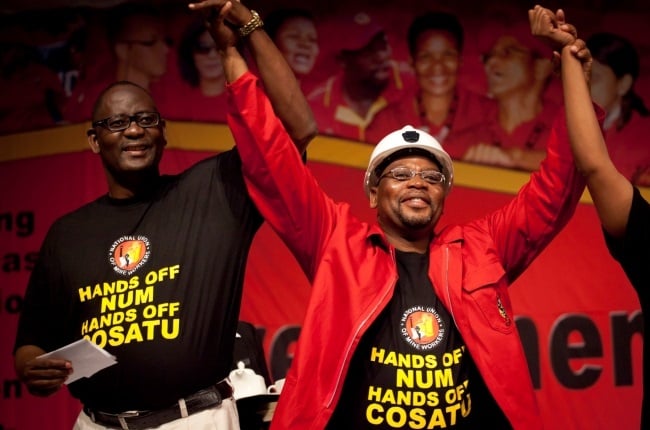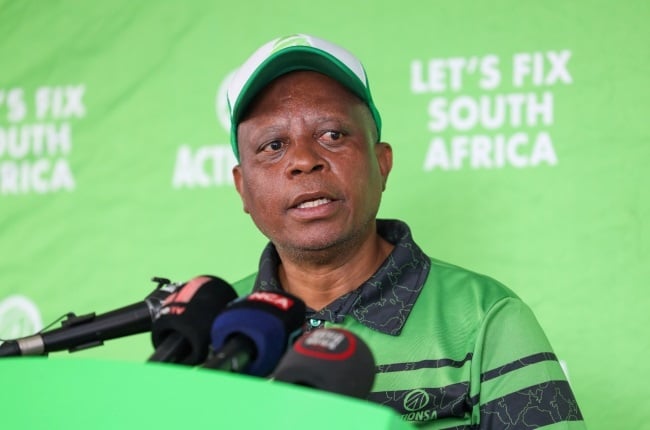
From Drum Magazine 4 October 2012
Damned if they do and damned if they don’t – that’s the position trade union federation Cosatu finds itself in now, according to political analyst Professor Somadoda Fikeni.
And this in SA’s busiest political year in a century, adds Fikeni.
He should know – the professor found himself in the thick of a heated debate at Cosatu’s elective conference recently when, as an outsider, his very presence was questioned.
Reports say delegates from the National Education Health and Allied Workers’ Union (Nehawu) objected to Fikeni speaking, even though he had been invited by the Cosatu leadership. You wouldn’t say from the show of unity at the end of the four-day talk shop that the atmosphere had got so heated.
Prickly issues were simply postponed, among them Cosatu’s preferred candidate for ANC president. Critics dismissed the united front, saying the union has merely swept tensions under the carpet.
But Fikeni, unfazed by the uproar he caused, says Cosatu had very little option.
“It wouldn’t take just one conference to thrash out these differences,” Fikeni told Drum. What’s more worrying are the implications of these divisions for the rest of the country.
Whether you agree with Cosatu’s economic and political views or not, you can’t ignore the fact that the organisation has a very influential role in the direction of our nation.
Read more | From the Archives | Party Politics looking at former President Zuma's 2nd term
Take, for example, its role in galvanising South Africans on controversial issues such as e-tolling and rising electricity prices. There is a fear that the current feuds and differences of opinion will draw attention away from the really big issues that desperately need to be tackled – such as unemployment and poverty.
It’s clear from the resolutions passed that the spats sapped Cosatu’s energy as most of them were simply repetitions of previous positions, such as calls for greater state intervention in the economy.
This can largely be attributed to the differences that became clear in the runup to the conference. The split centres roughly around two camps – those in favour of a more conciliatory stance with the ruling ANC and those who opt for no-holds-barred confrontation.
Cosatu president S’dumo Dlamini appears to be in favour a softer approach, unlike fiery general secretary Zwelinzima Vavi.
Yet there was no sign of this discontent when Dlamini closed the conference. Cosatu wants stable leadership, he told the 3 000 or so delegates who had congregated at Gallagher Estate in Midrand, Johannesburg.
“This is the message sent by the workers,” he said “Today, in particular, our own African National Congress needs stability as it proceeds to Mangaung.”
This kind of safe approach is quite new to Cosatu when compared to their militant attitude of the 1980s. Cosatu was formed 27 years ago as a coming-together of various unions opposed to apartheid.
It started off with around 500 000 members and back then rallied hundreds of thousands in protests and strikes that brought the government and industry to their knees. The union has around two million members today.
Fikeni says it’s only natural that Cosatu has softened somewhat over the last two decades. “In the 1980s, Cosatu was dealing with a hostile government so it would have been at its most militant,” he says.
“In essence it was dealing with the enemy. Cosatu today finds itself in a number of complex situations.
“Now it is part of an alliance with the ruling party. Some of its members are in government so their position is strained by that. Also, some of their leaders are interested in social mobility and that prevents them from being overly critical.”
To its credit, Cosatu has made some impact with issues such as youth wage subsidies and labour brokering, he adds.
And the union knows it must find the balance between criticism and compromise if it is to have further say in government. One positive outcome of the conference is that Cosatu managed to pin down the direction of its economic policy.
Even though it didn’t propose anything too drastically different, it did manage to identify a clearer economic model for South Africa by looking at Brazil, Fikeni says.
Brazil has experienced the same massive social problems as South Africa and the two countries are often in a neck-and-neck race for the title of most unequal society in the world. “Even within the policy debate the ANC can’t argue with that model,” says Fikeni.
“Most importantly its demographic features far more resemble South Africa than, say, Singapore or Hong Kong.” Predicting the outcome of Cosatu’s new line – or perhaps who will blink first between the ANC and its alliance partners – depends on who has the upper hand.
Read more | From the Archives | Meet Phumzile Mlambo-Ngcuka a champion for women
What’s certain is that the stalemate reached at Gallagher Estate is almost a sure sign of what’s to come in Mangaung in December when the ruling party gathers to crown its king. Many people have little doubt that President Jacob Zuma will be re-elected, if for no other reason than to preserve the unity the ANC so treasures.
The question is: at what cost to the country?
As Fikeni reminds us, the stakes will be even higher in Mangaung.
“Remember, Mangaung is different. The contest will be for seats on the ANC NEC (National Executive Committee).
“It’s not as easy, especially when people know that it improves their chances of becoming a minister, of being deployed into government. “It will also give them greater access to resources and that puts them in the pound seats.”
KEY QUOTES
“Christians are reminded of John chapter 14, verse 6, just as alliance members should be reminded of the words of ANC heroes such as former president, Chief Albert Luthuli.” -- Remark attributed to President Jacob Zuma.
“We are not saying that workers do not deserve their money, but if we are not careful this may mean an end of the central bargaining system in the country. Workers will just embark on wildcat strikes and steam ahead and force us to follow them.” -- Cosatu general secretary Zwelinzima Vavi.
“Mineworkers cannot be expected to keep quiet and say, ‘Thank-you, baas,’ when they know that the financial officer of Lonmin, Alan Ferguson earns R10 254 972 a year or R854 581 a month, which is 152 times higher than the salary of a rock drill operator.” – Cosatu president S’dumo Dlamini.
Numsa general secretary Irvin Jim said the ANC leadership issue was a “hot potato”. “As the metalworkers, we know many of us have campaigned and said so much about Mangaung.” Jim told delegates in Midrand.



















